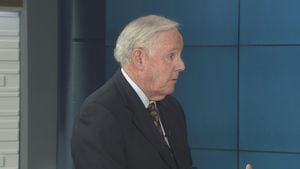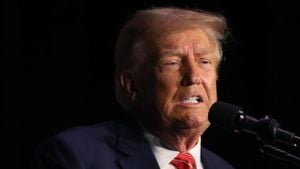Donald Trump has officially met with President Joe Biden at the White House as part of the transition process following the recent election. The meeting, which lasted approximately two hours, covered several significant topics, including overseas conflicts and the smooth transfer of presidential power—a tradition upheld by prior administrations. Trump, who won the election decisively and is projected to enjoy Republican majorities in both the House of Representatives and the Senate, was reported to have expressed to Biden, "politics is tough" but endured with good humor during their discussions.
This meeting is not only symbolic but could be impactful as Trump seeks to fill his cabinet positions swiftly. With Republican control confirmed across Congress, he has the backing needed to enact his policy agenda effectively. Some nominees, including prominent figures like Florida Senator Marco Rubio as Secretary of State, have raised eyebrows among political circles, reflecting the divided opinion on his choices.
Trump's recent cabinet picks, announced shortly after the election, have stirred significant conversation. The nomination of Matt Gaetz, a congressman from Florida, as Attorney General drew major backlash, particularly from Department of Justice officials. An insider was quoted expressing utter disbelief at the choice, remarking, "What the f--- is happening?" Others alluded to Gaetz's previous legal troubles, including investigations linked to sex trafficking, making his nomination controversial at best.
Adding to the spectacle, Trump has also thrown his support behind former Democratic congresswoman Tulsi Gabbard to lead national intelligence. Gabbard's relatively moderate political history could create interesting dynamics within the cabinet, though her controversial stances have drawn skepticism from various political commentators.
Many are questioning how Trump's previous administration's behavior would influence his current approach to governance as he steps back onto the political stage. He mentioned to reporters after the meeting, with characteristic bravado, his intention to lead boldly and reshape the federal bureaucracy, dismissing conventional procedures as remnants of the 'deep state'. Supporters within his party champion these moves, viewing them as necessary to reestablish true conservative values.
The stark division within the Republican Party is evident. Senators like John Thune, confirmed as the next Senate leader, face immediate challenges as they try to maintain party unity amid Trump's polarizing nominations. While some senators support the former president's initiative, others have expressed concern about potential extreme policies and the influence of Trump's allies, who may steer the legislative agenda far from centrist principles.
Meanwhile, political analysts are closely monitoring how these developments might buffer the central theme of Biden's presidency. Will Biden's focus on bipartisanship hold strong? Or will the divide become insurmountable as Trump adapts the political norms back to his unorthodox style?
Following the meeting, Trump humorously speculated about his political future, mentioning the possibility of running again for president in 2028, demonstrating his characteristic confidence. Biden has publicly stated his commitment to ensuring a seamless transfer of power, highlighting the dignity of the transition process, even amid the political storm.
What’s even more intriguing is how his appointment of Gaetz might directly affect legal proceedings against Trump himself. Observers note there have been discussions about potential avenues of retribution against those who investigated the former president—a reflection of Trump’s long-standing grievances against the justice system.
Despite the initial excitement surrounding his cabinet choices, discontent looms among Republicans, leading to calls for strict scrutiny from Senate leaders concerning Gaetz's past allegations of misconduct. Some senators indicate they intend to balance loyalty to Trump with their commitments to their constituents.
Trump’s choices—both divisive and strategic—signal his desire to assert control over the political narrative just as he consumes headlines once more. The variety of figures chosen indicates Trump’s wider broadening of political alliances, reaching across some factional divides. Gabbard's selection could hint at new directions for healthcare discussions, as her policies diverge from traditional Democratic stances, leading to speculative discourse on the effectiveness of her strategies.
Democrats are not sitting idly by; plans are underway to reinforce limitations on Trump’s tenure through legislative measures, ensuring clarity on the limits imposed by the 22nd Amendment concerning presidential terms.
Looking forward, Trump’s presidency is set to reignite fierce debates within Congress, particularly due to the stark contrasts between his administration's values and those of his predecessors. Analysts see this as posing risk and opportunity for the Democrats, who will need to rally quickly to consolidate their influence as the new Congress begins.
This political evolution will be followed closely by constituents eager for signs of effective governance as both former and current leaders navigate the complex choreography of power transition. If the past is any indication, both Biden and Trump will have to adapt quickly to not only the changing political winds but also to the expectations of those who put them back at the forefront of American politics.



